Understanding Viva V Samana by Wyndham and exiting their timeshare

Understanding Viva V Samana by Wyndham
Viva V Samana by Wyndham presents itself as an exclusive, adults-only retreat in the Dominican Republic's Samaná region. Marketed as part of Wyndham's upscale V Collection, the resort promises a premium all-inclusive experience with boutique-style accommodations and amenities. However, numerous guest reports and reviews reveal significant discrepancies between these promises and the actual on-site experience.
For potential visitors, and particularly for timeshare owners, these consistent issues raise important questions about the resort's value and long-term viability. From maintenance concerns to service shortcomings, the problems at Viva V Samana go beyond typical vacation complaints, potentially affecting those who have made financial commitments through timeshare purchases.
This examination looks closely at what the resort offers, where it falls short, and what options exist for those seeking to exit their timeshare agreements. Whether you're considering a purchase or exploring exit strategies, understanding these realities is essential for making informed decisions about Viva V Samana.
What Is Viva V Samana by Wyndham?
Viva V Samana by Wyndham is an adults-only, all-inclusive resort in Las Terrenas, Samaná, in the Dominican Republic. It’s part of the V Collection, a subset of Viva Resorts by Wyndham that focuses on upscale, all-inclusive, adult-only experiences.
Viva Resorts by Wyndham has been around since 1987 and operates multiple properties across the Caribbean, Mexico, and the Bahamas, like Viva Dominicus, Viva Tangerine, and Viva Fortuna Beach. While many of these resorts cater to families, Viva V Samana stands out as an adults-only option, marketed as a more tranquil, boutique-style getaway.
The resort falls under Wyndham’s Trademark Collection, a branding system where independent hotels keep their unique identity but follow Wyndham’s standards. Viva Resorts remains a Dominican-based company, but the Wyndham affiliation gives it wider visibility, especially after Wyndham spun off from Travel + Leisure Co. in 2018.
In short: Viva V Samana is owned and operated by Viva Resorts but branded under Wyndham’s umbrella.
How It Differs from Other Viva Resorts
- Adults-only – Unlike family-friendly Viva properties (e.g., Viva Maya or Viva Fortuna Beach), this one restricts guests to 18+.
- Upscale(ish) amenities – The resort promotes features like an infinity pool, multiple à la carte restaurants, and a spa, aiming for a more refined experience.
That said, "upscale" doesn’t always mean "flawless," and some guests have found the reality doesn’t quite match the marketing.
Common Complaints & Issues at Viva V Samana
If you’re considering a timeshare here, or already stuck with one, these are the problems guests keep reporting:
1. Food & Dining Problems
- The buffet has been called mediocre, cold, or bland, with some guests mentioning flies and unhygienic conditions.
- À la carte reservations can be a hassle, some guests couldn’t get a table despite being told they’d have access.
2. Room Conditions & Maintenance
- High humidity and mold are recurring issues, with guests complaining about damp sheets and musty smells.
- Some rooms reportedly had sewer-like odors upon arrival.
- Ants have been a big problem, guests report being bitten in rooms, on balconies, and even on beach furniture, sometimes leaving lasting marks.
- Sand fleas and bugs around the pool and beach areas are also frequently mentioned.
3. Service & Staff Issues
- Front desk staff have been described as indifferent or dismissive, especially when guests ask for help.
- Housekeeping delays mean rooms might not get cleaned until mid-afternoon.
4. Billing & Sales Tactics
- Unexpected charges have popped up on bills (e.g., added massage fees that only got removed after arguing).
- Aggressive timeshare pitches, guests report being pressured into "Viva club" memberships or dragged into long sales presentations that feel deceptive.
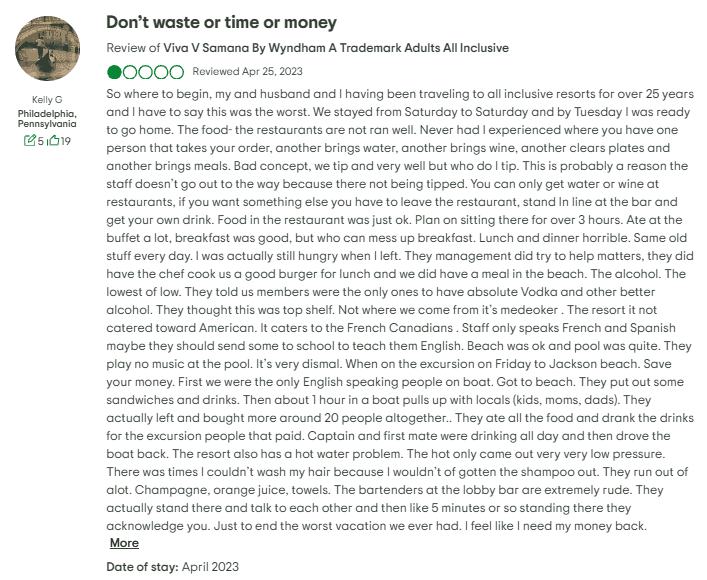
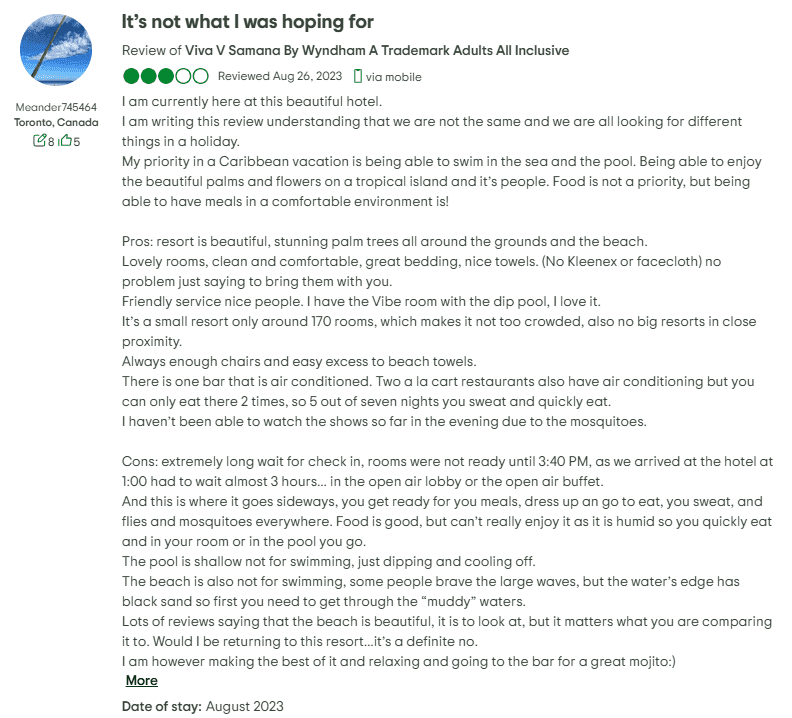
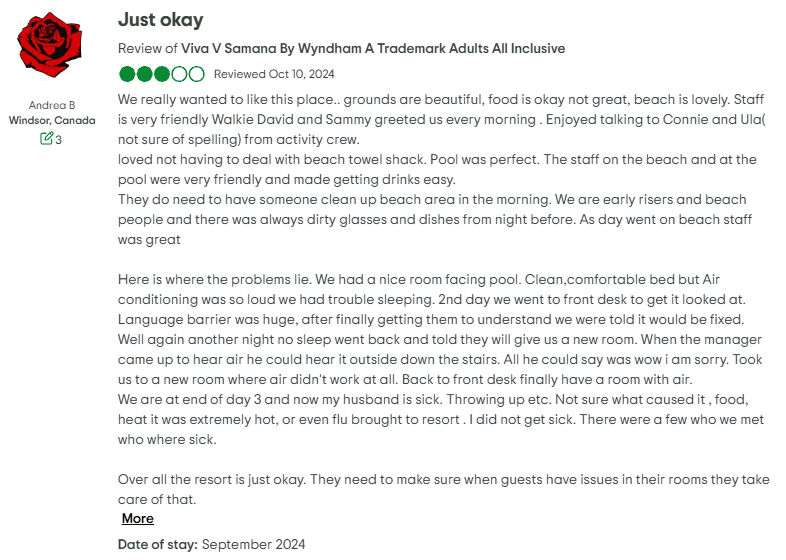
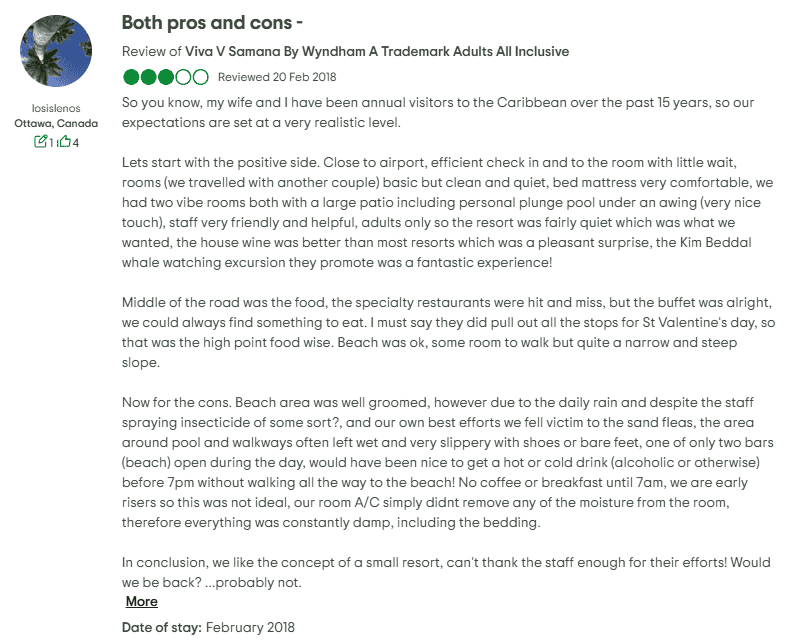
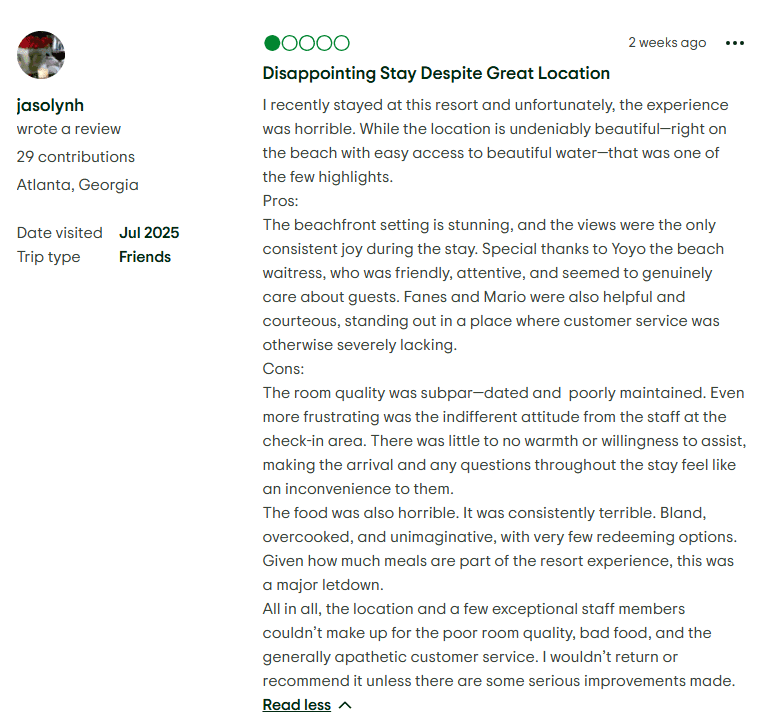
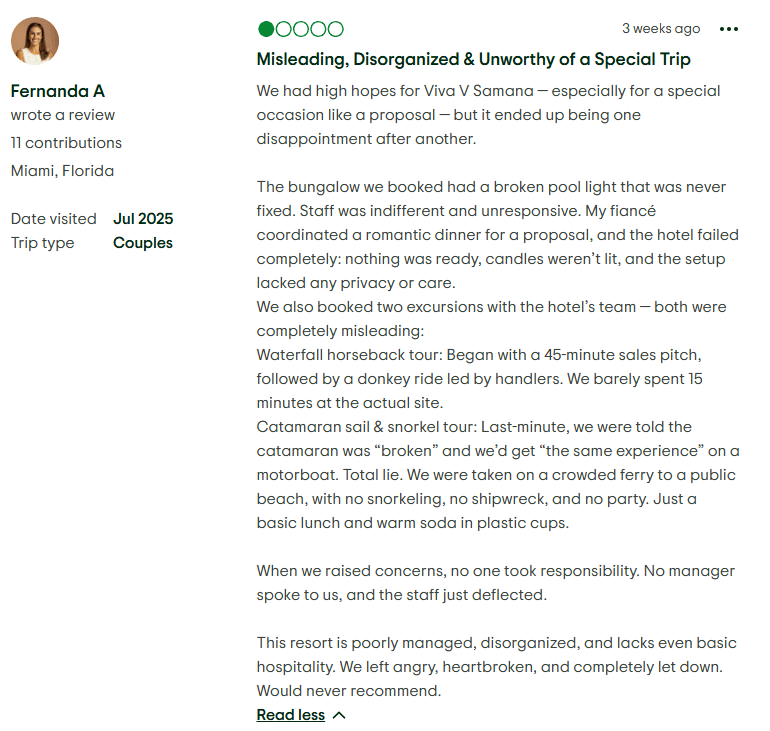
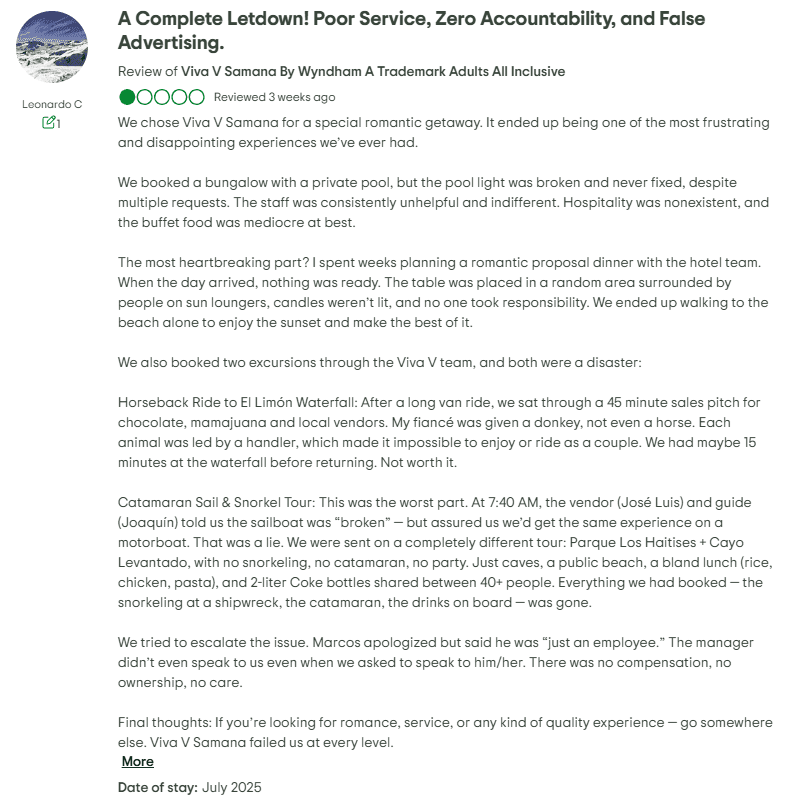
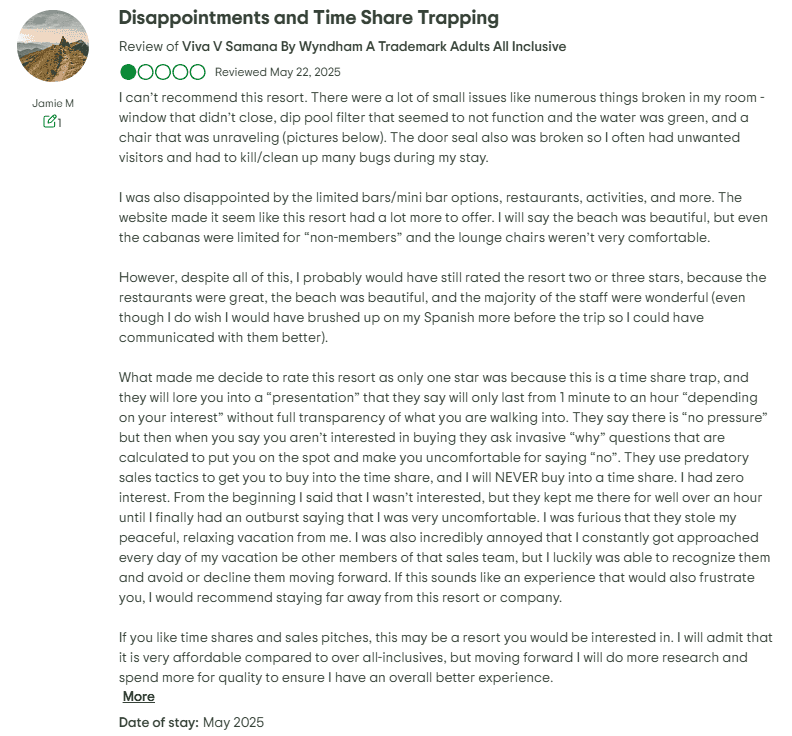
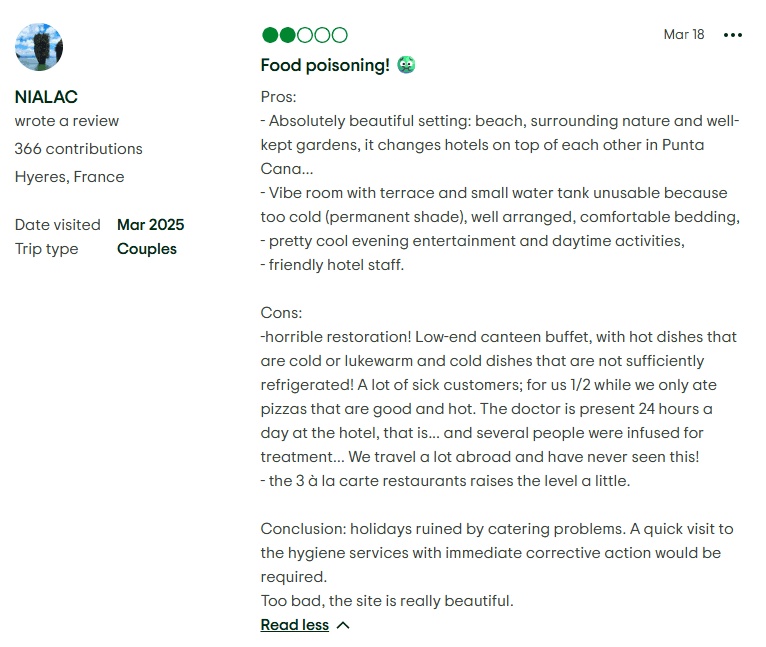
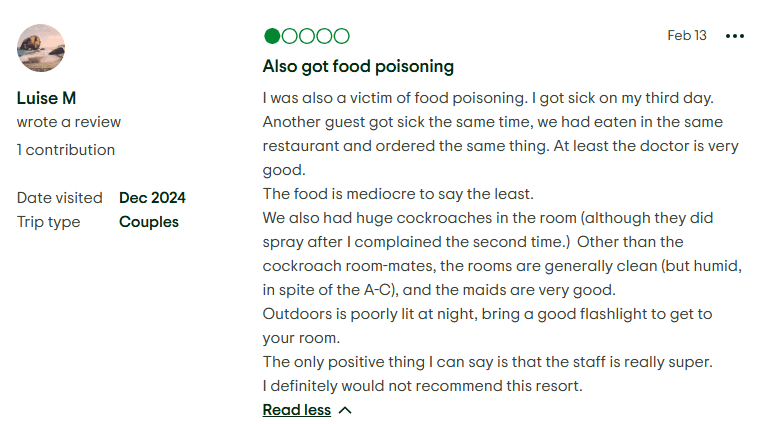
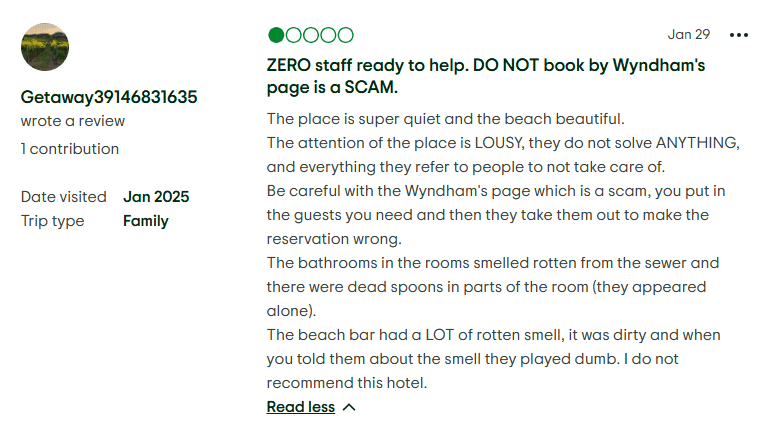
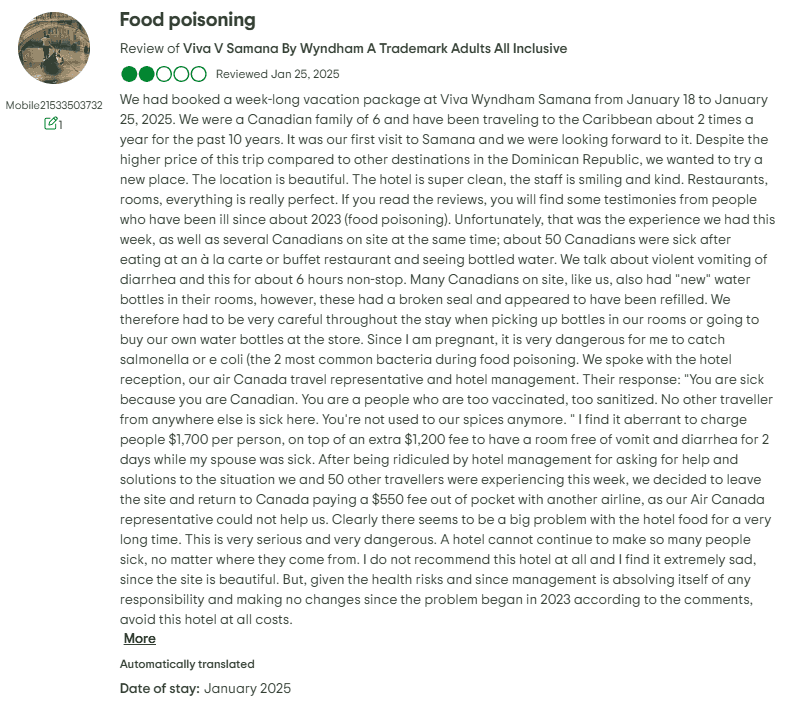
Why This Matters for Timeshare Owners
If you’ve bought into Viva V Samana as a timeshare, these issues might make you question whether it’s worth keeping. Here’s why:
- Declining Experience – The problems like mold, insects, and power outages suggest underinvestment in property upkeep and infrastructure. Poor food quality and indifferent service point to deeper management issues. For an owner, this translates into a future of paying annual maintenance fees for a product that is demonstrably deteriorating. The difficulty of booking à la carte restaurants or the aggressive push to sell more "club" memberships to existing owners makes each stay feel less like a privileged escape and more like a transactional hassle.
- Difficulty Reselling – The association with Wyndham’s Trademark Collection, while adding a layer of brand recognition, also adds a layer of corporate bureaucracy. This can make resolving individual owner complaints feel like shouting into the void. When the on-the-ground reality fails so consistently to meet the brand's promise, your deed becomes a liability. The prospect of reselling your timeshare on the secondary market becomes incredibly difficult when potential buyers can easily find this volume of negative feedback online. You aren't just locked into a financial contract; you are locked into a declining asset.
Your Path Forward: Exiting a Viva V Samana Timeshare
Recognizing that your timeshare is a burden is the first step. The second, and more difficult step, is extracting yourself from a contract designed to be perpetual. The complexity of timeshare agreements, especially those intertwined with a large corporate structure like Wyndham's, makes a successful exit highly challenging to navigate alone.
Simply stopping payment is not a viable solution, as it can lead to damaged credit, debt collection actions, and foreclosure. This is where a legitimate timeshare exit company becomes a necessary partner. These firms specialize in understanding the intricate legal and contractual loopholes that can be used to terminate your ownership. They handle the negotiations and paperwork with the resort and the parent company, leveraging their expertise to achieve a legal release from your obligations.
When seeking an exit company, due diligence is critical. Seek out firms with a proven track record, verifiable testimonials, and transparent pricing structures. A reputable company will clearly explain its process and will not demand large upfront fees before any service is rendered.
Final Thoughts
If the consistent complaints about maintenance, service, and value reflect your own experiences, it is a strong indicator to consider a permanent exit. By engaging a qualified and reputable timeshare exit company, you can navigate the complex process of contract cancellation and finally sever ties with a burdensome investment.


